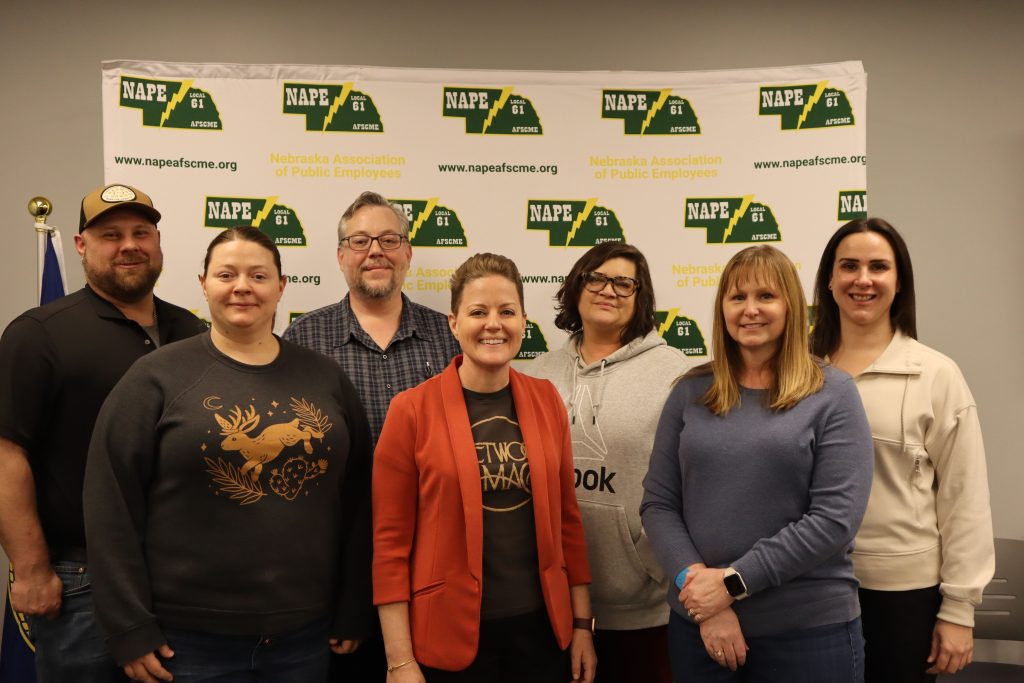Nick Batter

Nick Batter is an Omaha native who is running for the Nebraska legislature because he believes that public service is important and that there are still a lot of challenges in his district that he wants to address. He feels indebted to public employees, especially the teachers who supported him through high school and helped him maintain grades that were good enough to land him a full scholarship to Harvard University. He wrote his final thesis on public infrastructure construction in Nebraska.
Batter believes that the most pressing issues facing Nebraskans are a bundle of things that are all interconnected: the cost of childcare, housing, and the basic cost of living. He said that he has a hard time imagining what it would be like for someone like his mom, who was a single mother, to make it today without family resources.
Batter said he’s thankful for the public services he had access to while growing up. These services gave him access to a myriad of things, but an especially important one was mental health care.
Batter said he knows that public services in our state are understaffed. This, he said, causes a vicious cycle of placing additional burdens on employees when unfulfilled roles leave necessary work unfinished. He would solve this issue by increasing wages and working to improve working conditions.
When asked about funding public services, Batter noted that Nebraska has a unique budgeting structure. To ensure public services are fully funded, Batter stated that the legislature needs to find funding opportunities and be mindful of where taxes are going.
In some cases, Batter sometimes supports the privatization or contracting out of services to private companies. In another sense, he generally opposes privatization because it poses a danger to certain people when there is a lack of oversight.
Batter supports the right of Nebraska State Employees to unionize and collectively bargain. He noted that as a taxpayer, he wants the government to be a good steward of tax dollars and negotiate appropriately, but public service workers should not be underpaid. When asked about a bill that would expand public sector collective bargaining to include legislative workers like judicial branch workers like probation officers and clerks, Batter said he would have to think about the implications but that it generally isn’t a bad idea.
Batter stated that he would oppose any legislation that aimed to take away public sector collective bargaining rights in Nebraska.
When asked about legislative procedure, Batter said he believes committee chairs should be chosen by secret ballot and he would not change any of the current filibuster rules — though he hopes that the filibuster remains a productive tool and does not become a weapon for hyper-partisan issues.
Batter said his door is never closed and would like to collaborate with our union about worker safety standards.
Matthew Clough

Matt Clough was the Chief Operating Officer for the Department of Health and Human Services for six years under Dave Heineman’s administration. Clough said he has always been engaged politically and has often been encouraged to run for office. Now that he has the time and energy to do so, Clough hopes to bring his years of experience to the legislature.
Clough said that the most important issue facing Nebraskans today is the workforce shortage. He stated that our leaders need to find ways to have a steady stream of talented people stepping into open jobs — especially as large swaths of the workforce transition into retirement.
As the COO of DHHS, Clough saw firsthand the importance of the public services that the State of Nebraska provides. He said that he believes these services are an essential safety net for people to be able to persevere through difficult times.
When asked what public service jobs he thinks are lacking in Nebraska, Clough said that there aren’t enough experienced tradesmen who can perform maintenance on both the new and old buildings, like 24-hour facilities, that house Nebraskans. To address this, Clough said that recruiting people early is key and that there should be apprenticeship programs available that prepare and excite them for their future careers.
Clough said that fully funding public services is a difficult task because everything that goes before the legislature falls somewhere on a scale of importance. While no request is unimportant, allocating funding ultimately comes down to timing and having the right people behind the request.
Clough does not support the privatization of state services. At DHHS, he saw firsthand how the motivations and quality of care change when privatization happens.
Clough stated that he supports the right of State of Nebraska employees to unionize and collectively bargain and he would oppose any bill introduced to take away public sector collective bargaining rights in Nebraska. He said that he would have to study any such bill that would expand bargaining rights to legislative and judicial branch employees, but on the surface it makes sense for them to have access to bargaining.
When asked about legislative procedure, Clough said that committee chairs should be selected by public vote. He also stated that the current filibuster rules should be re-considered in order to ensure that legislative sessions move efficiently.
Clough said that he is the best candidate because of his experience working in both state government and with bureaucratic organizations on both a national and international level.
Tracy Hightower-Henne

Tracy Hightower-Henne has lived in Nebraska her entire life. She started a law firm 12 years ago and works primarily in family law but has a tax background. She was approached and asked to run for the legislature eight years ago but didn’t feel like the time was right. Now, she’s running because she wants Nebraska to be a place that attracts new people and retains those who already live here.
Hightower-Henne said the most important issue facing Nebraskans today is that they can’t afford to buy homes, groceries, or pay bills. She said that our state should be a place where people thrive, but that they’re not making a livable wage and the legislature is getting off track by not addressing these issues.
When asked about public services she uses, Hightower-Henne said that through her work, she encounters the Department of Health and Human Services and works with caseworkers to reunite families. She said that it has been eye-opening to see just how many services DHHS provides and noted that she sees how hard employees work for the children and families that they serve. She also enjoys spending time at the Nebraska State Parks and knows that it’s important to maintain these natural areas to attract and retain people.
Hightower-Henne is aware of the public services that are lacking in Nebraska. She stated that the rural Department of Motor Vehicles office closures are concerning and Nebraskans shouldn’t lack access to DMV resources because we cannot provide pay that’s commensurate with the work that’s done.
In order to fully fund public services, Hightower-Henne said that the Appropriations Committee must be well-rounded. She opposes the privatization and contracting out of state services and stated that as long as the legislature works to appropriately fund government services and retain employees, there should not be a need for privatization.
Hightower-Henne said that she supports the right of Nebraska State Employees to unionize and collectively bargain and she does not know why legislative and judicial branch employees are not allowed to organize. She would support legislation that would expand public sector collective bargaining to include legislative and judicial branch employees and would staunchly oppose any bill aimed at taking away public sector collective bargaining in Nebraska.
Hightower-Henne believes that committee chairs should be chosen by secret ballot and supports the current filibuster rules.
Ashlei Spivey

Ashlei Spivey is a native Nebraskan who works in community organizing and economic development. She runs a nonprofit organization in Omaha called I Be Black Girl which focuses on, amongst a myriad of other things, reproductive justice and autonomy for Black women, femmes, and girls. Spivey is running for the legislature because she wants to bring different ideas and approaches to what policy looks like in Nebraska.
Spivey stated that the most important issue facing Nebraskans is economic disparities. When asked what public services provided by state employees are lacking in Nebraska, she said that there’s a workforce shortage affecting different industries across the state. Spivey said that to mitigate these issues, steps must be taken to attract and retain talent. This includes building communities where workers feel valued.
Through her work, Spivey has a lot of contact with the Department of Health and Human Services, especially in regards to maternal health and access to Medicaid. Spivey opposes the privatization of state services to private companies.
Spivey said she would work to ensure public services and programs are fully funded. To do so, Spivey stated that Nebraska could benefit from following the models that other states have developed for the legalization and taxation of marijuana.
Spivey supports the right of Nebraska State Employees to unionize and collectively bargain the wages and conditions of employment. She stated that the labor movement is a blueprint and basis for self-advocacy. She would support a bill expanding public sector collective bargaining to include legislative and judicial branch employees. She would oppose any bill introduced that would take away public sector collective bargaining rights in Nebraska.
When asked about legislative procedures, Spivey stated that she believes committee chairs should be chosen by public vote. She stated that she supports the filibuster but would be intentional about re-assessing the rules should she be elected.
Spivey said that her approach to policy is what separates her from other candidates. She feels that some diverse identities are missing from the legislature, and she wants to be a part of creating policy that acts as a meaningful lever of change. Spivey shared that she filed for legislature at the deadline because she was the Board President for the Nebraska ACLU, excluding her from running for or holding office, and needed to make sure that the organization was in a good place before she could file. She also had to make sure that her decision to run made sense for her family.